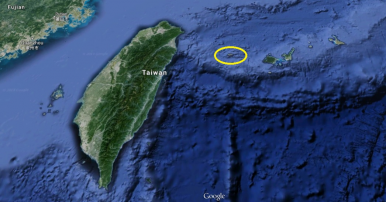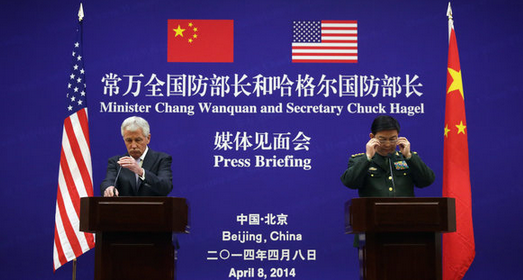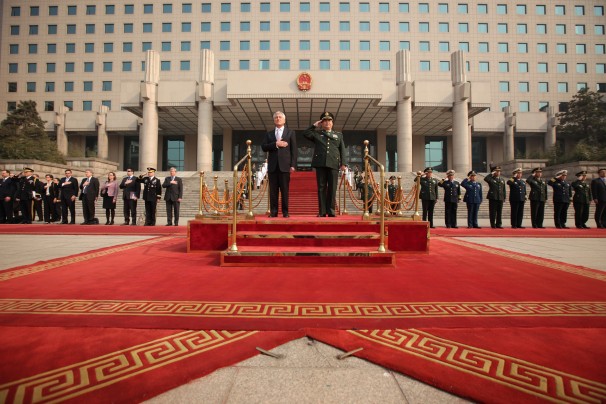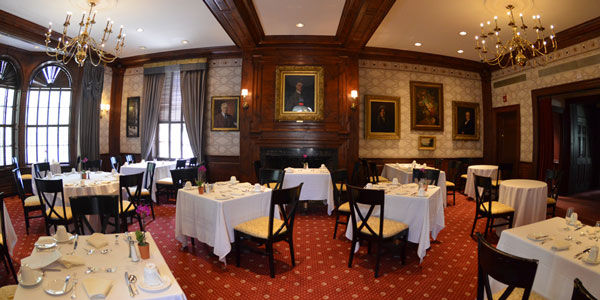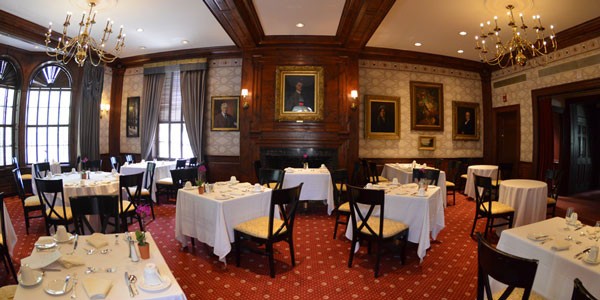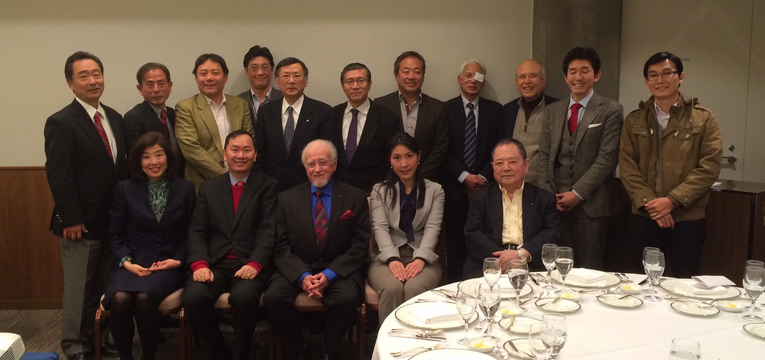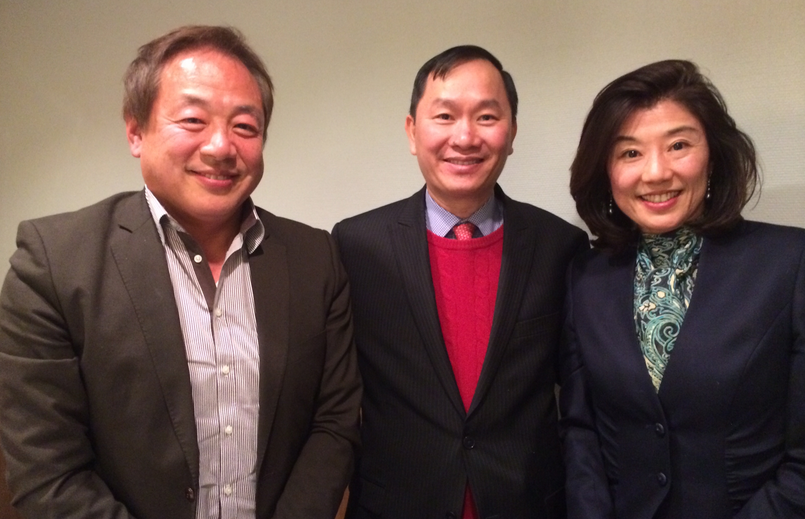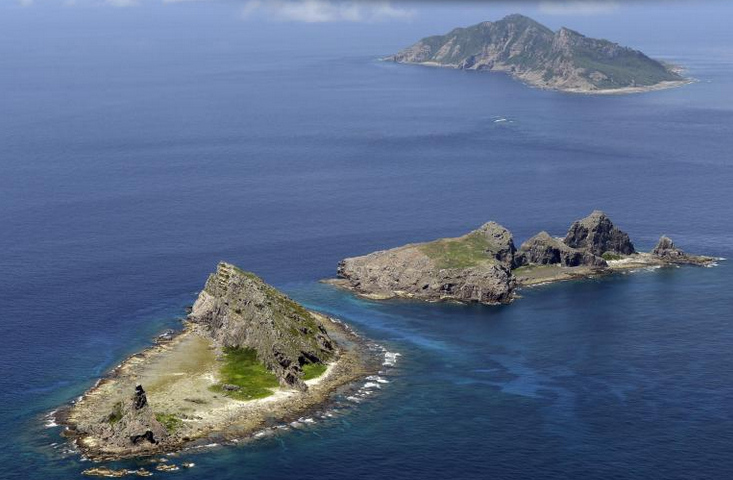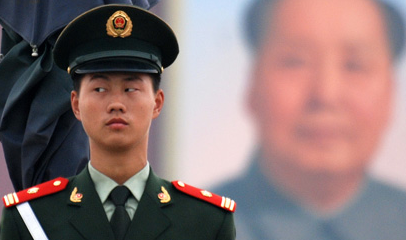
by Admin | Apr 17, 2014 | News

(Photo Credit: Ed-meister / flickr)
(BGF) – In the March/April 2012 edition of Foreign Affairs Henry Kissinger discussed the future of the U.S.-Chinese relationship. Throughout the article, Kissinger emphasizes that conflict is a choice, rather than an inevitability. Thus, the goal of cooperation between these two great powers is realizable. As Kissinger notes, both the U.S. and China must be careful to recognize the other’s fears and the ways in which rhetoric, as well as policies, can feed into those fears. For example, some in the U.S. perceive China’s actions as a way to push the U.S. out of East Asia and to cement China’s power and influence in the region. This, however, is a possibility that the U.S. fears and would take great strides to prevent. As for China, many fear that the U.S. is a “wounded” superpower that will due anything in its power to curtail China’s rise internationally. Each country must take these concerns into account in their relations with one another. Moreover, the U.S.-China relationship must not be viewed as a zero-sum game. While there are no historical precedents to guide these two powerful, yet very different, countries through their complex, and at times, tense relationship an appropriate understanding of each country’s circumstances can breed cooperation rather than conflict. Click here to read the full article or visit Foreign Affair‘s website.
The Future of U.S.-Chinese Relations
By Henry A. Kissinger
On January 19, 2011, U.S. President Barack Obama and Chinese President Hu Jintao issued a joint statement at the end of Hu’s visit to Washington. It proclaimed their shared commitment to a “positive, cooperative, and comprehensive U.S.-China relationship.” Each party reassured the other regarding his principal concern, announcing, “The United States reiterated that it welcomes a strong, prosperous, and successful China that plays a greater role in world affairs. China welcomes the United States as an Asia-Pacific nation that contributes to peace, stability and prosperity in the region.”
Since then, the two governments have set about implementing the stated objectives. Top American and Chinese officials have exchanged visits and institutionalized their exchanges on major strategic and economic issues. Military-to-military contacts have been restarted, opening an important channel of communication. And at the unofficial level, so-called track-two groups have explored possible evolutions of the U.S.-Chinese relationship.
Yet as cooperation has increased, so has controversy. Significant groups in both countries claim that a contest for supremacy between China and the United States is inevitable and perhaps already under way. In this perspective, appeals for U.S.-Chinese cooperation appear outmoded and even naive.
The mutual recriminations emerge from distinct yet parallel analyses in each country. Some American strategic thinkers argue that Chinese policy pursues two long-term objectives: displacing the United States as the preeminent power in the western Pacific and consolidating Asia into an exclusionary bloc deferring to Chinese economic and foreign policy interests. In this conception, even though China’s absolute military capacities are not formally equal to those of the United States, Beijing possesses the ability to pose unacceptable risks in a conflict with Washington and is developing increasingly sophisticated means to negate traditional U.S. advantages. Its invulnerable second-strike nuclear capability will eventually be paired with an expanding range of antiship ballistic missiles and asymmetric capabilities in new domains such as cyberspace and space. China could secure a dominant naval position through a series of island chains on its periphery, some fear, and once such a screen exists, China’s neighbors, dependent as they are on Chinese trade and uncertain of the United States’ ability to react, might adjust their policies according to Chinese preferences. Eventually, this could lead to the creation of a Sinocentric Asian bloc dominating the western Pacific. The most recent U.S. defense strategy report reflects, at least implicitly, some of these apprehensions.
No Chinese government officials have proclaimed such a strategy as China’s actual policy. Indeed, they stress the opposite. However, enough material exists in China’s quasi-official press and research institutes to lend some support to the theory that relations are heading for confrontation rather than cooperation.
U.S. strategic concerns are magnified by ideological predispositions to battle with the entire nondemocratic world. Authoritarian regimes, some argue, are inherently brittle, impelled to rally domestic support by nationalist and expansionist rhetoric and practice. In these theories — versions of which are embraced in segments of both the American left and the American right — tension and conflict with China grow out of China’s domestic structure. Universal peace will come, it is asserted, from the global triumph of democracy rather than from appeals for cooperation. The political scientist Aaron Friedberg writes, for example, that “a liberal democratic China will have little cause to fear its democratic counterparts, still less to use force against them.” Therefore, “stripped of diplomatic niceties, the ultimate aim of the American strategy [should be] to hasten a revolution, albeit a peaceful one, that will sweep away China’s one-party authoritarian state and leave a liberal democracy in its place.”
On the Chinese side, the confrontational interpretations follow an inverse logic. They see the United States as a wounded superpower determined to thwart the rise of any challenger, of which China is the most credible. No matter how intensely China pursues cooperation, some Chinese argue, Washington’s fixed objective will be to hem in a growing China by military deployment and treaty commitments, thus preventing it from playing its historic role as the Middle Kingdom. In this perspective, any sustained cooperation with the United States is self-defeating, since it will only serve the overriding U.S. objective of neutralizing China. Systematic hostility is occasionally considered to inhere even in American cultural and technological influences, which are sometimes cast as a form of deliberate pressuredesigned to corrode China’s domestic consensus and traditional values. The most assertive voices argue that China has been unduly passive in the face of hostile trends and that (for example, in the case of territorial issues in the South China Sea) China should confront those of its neighbors with which it has disputed claims and then, in the words of the strategic analyst Long Tao, “reason, think ahead and strike first before things gradually run out of hand . . . launch[ing] some tiny-scale battles that could deter provocateurs from going further.”
THE PAST NEED NOT BE PROLOGUE
Is there, then, a point in the quest for a cooperative U.S.-Chinese relationship and in policies designed to achieve it? To be sure, the rise of powers has historically often led to conflict with established countries. But conditions have changed. It is doubtful that the leaders who went so blithely into a world war in 1914 would have done so had they known what the world would be like at its end. Contemporary leaders can have no such illusions. A major war between developed nuclear countries must bring casualties and upheavals impossible to relate to calculable objectives. Preemption is all but excluded, especially for a pluralistic democracy such as the United States.
If challenged, the United States will do what it must to preserve its security. But it should not adopt confrontation as a strategy of choice. In China, the United States would encounter an adversary skilled over the centuries in using prolonged conflict as a strategy and whose doctrine emphasizes the psychological exhaustion of the opponent. In an actual conflict, both sides possess the capabilities and the ingenuity to inflict catastrophic damage on each other. By the time any such hypothetical conflagration drew to a close, all participants would be left exhausted and debilitated. They would then be obliged to face anew the very task that confronts them today: the construction of an international order in which both countries are significant components.
The blueprints for containment drawn from Cold War strategies used by both sides against an expansionist Soviet Union do not apply to current conditions. The economy of the Soviet Union was weak (except for military production) and did not affect the global economy. Once China broke off ties and ejected Soviet advisers, few countries except those forcibly absorbed into the Soviet orbit had a major stake in their economic relationship with Moscow. Contemporary China, by contrast, is a dynamic factor in the world economy. It is a principal trading partner of all its neighbors and most of the Western industrial powers, including the United States. A prolonged confrontation between China and the United States would alter the world economy with unsettling consequences for all.
Nor would China find that the strategy it pursued in its own conflict with the Soviet Union fits a confrontation with the United States. Only a few countries — and no Asian ones — would treat an American presence in Asia as “fingers” to be “chopped off” (in Deng Xiaoping’s graphic phrase about Soviet forward positions). Even those Asian states that are not members of alliances with the United States seek the reassurance of an American political presence in the region and of American forces in nearby seas as the guarantor of the world to which they have become accustomed.Their approach was expressed by a senior Indonesian official to an American counterpart: “Don’t leave us, but don’t make us choose.”
China’s recent military buildup is not in itself an exceptional phenomenon: the more unusual outcome would be if the world’s second-largest economy and largest importer of natural resources did not translate its economic power into some increased military capacity. The issue is whether that buildup is open ended and to what purposes it is put. If the United States treats every advance in Chinese military capabilities as a hostile act, it will quickly find itself enmeshed in an endless series of disputes on behalf of esoteric aims. But China must be aware, from its own history, of the tenuous dividing line between defensive and offensive capabilities and of the consequences of an unrestrained arms race.
China’s leaders will have their own powerful reasons for rejecting domestic appeals for an adversarial approach — as indeed they have publicly proclaimed. China’s imperial expansion has historically been achieved by osmosis rather than conquest, or by the conversion to Chinese culture of conquerors who then added their own territories to the Chinese domain. Dominating Asia militarily would be a formidableundertaking. The Soviet Union, during the Cold War, bordered on a string of weak countries drained by war and occupation and dependent on American troop commitments for their defense. China today faces Russia in the north; Japan and South Korea, with American military alliances, to the east; Vietnam and India to thesouth; and Indonesia and Malaysia not far away. This is not a constellationconducive to conquest. It is more likely to raise fears of encirclement. Each of these countries has a long military tradition and would pose a formidable obstacle if its territory or its ability to conduct an independent policy were threatened. A militant Chinese foreign policy would enhance cooperation among all or at least some of these nations, evoking China’s historic nightmare, as happened in the period 2009–10.
DEALING WITH THE NEW CHINA
Another reason for Chinese restraint in at least the medium term is the domestic adaptation the country faces. The gap in Chinese society between the largely developed coastal regions and the undeveloped western regions has made Hu’s objective of a “harmonious society” both compelling and elusive. Cultural changes compound the challenge. The next decades will witness, for the first time, the full impact of one-child families on adult Chinese society. This is bound to modify cultural patterns in a society in which large families have traditionally taken care of the aged and the handicapped. When four grandparents compete for the attention of one child and invest him with the aspirations heretofore spread across many offspring, a new pattern of insistent achievement and vast, perhaps unfulfillable, expectations may arise.
All these developments will further complicate the challenges of China’sgovernmental transition starting in 2012, in which the presidency; the vice-presidency; the considerable majority of the positions in China’s Politburo, State Council, and Central Military Commission; and thousands of other key national and provincial posts will be staffed with new appointees. The new leadership group will consist, for the most part, of members of the first Chinese generation in a century and a half to have lived all their lives in a country at peace. Its primary challenge will be finding a way to deal with a society revolutionized by changing economic conditions, unprecedented and rapidly expanding technologies of communication, a tenuous global economy, and the migration of hundreds of millions of people from China’s countryside to its cities. The model of government that emerges will likely be a synthesis of modern ideas and traditional Chinese political and cultural concepts, and the quest for that synthesis will provide the ongoing drama of China’s evolution.
These social and political transformations are bound to be followed with interest and hope in the United States. Direct American intervention would be neither wise nor productive. The United States will, as it should, continue to make its views known on human rights issues and individual cases. And its day-to-day conduct will expressits national preference for democratic principles. But a systematic project to transform China’s institutions by diplomatic pressure and economic sanctions is likely to backfire and isolate the very liberals it is intended to assist. In China, it would be interpreted by a considerable majority through the lens of nationalism, recalling earlier eras of foreign intervention.
What this situation calls for is not an abandonment of American values but a distinction between the realizable and the absolute. The U.S.-Chinese relationship should not be considered as a zero-sum game, nor can the emergence of a prosperous and powerful China be assumed in itself to be an American strategic defeat.
A cooperative approach challenges preconceptions on both sides. The United States has few precedents in its national experience of relating to a country of comparable size, self-confidence, economic achievement, and international scope and yet with such a different culture and political system. Nor does history supply China withprecedents for how to relate to a fellow great power with a permanent presence in Asia, a vision of universal ideals not geared toward Chinese conceptions, and alliances with several of China’s neighbors. Prior to the United States, all countries establishing such a position did so as a prelude to an attempt to dominate China.
The simplest approach to strategy is to insist on overwhelming potential adversaries with superior resources and materiel. But in the contemporary world, this is only rarely feasible. China and the United States will inevitably continue as enduring realities for each other. Neither can entrust its security to the other — no great power does, for long — and each will continue to pursue its own interests, sometimes at the relative expense of the other. But both have the responsibility to take into account the other’s nightmares, and both would do well to recognize that their rhetoric, as much as their actual policies, can feed into the other’s suspicions.
Click here to read the full article.
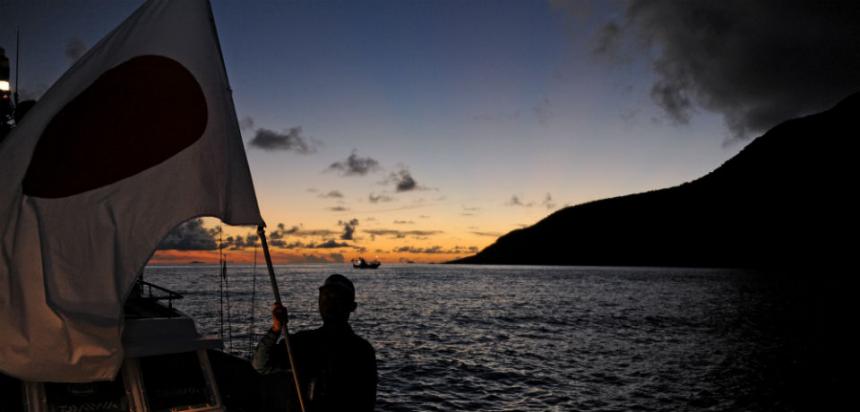
by Admin | Apr 14, 2014 | News

(Photo Credit: ANTOINE BOUTHIER/AFP/GettyImages)
(BGF) – A recent article published in Foreign Policy explored the possibility that China might actually attempt to seize Japan’s southern islands. The article begins by laying out the possible rationales for a Chinese attempt to seize the islands, before delving into possible strategies China may employ if it were to attempt such a take-over, and a discussion of how Japan and the U.S. can ensure that this scenario does not turn into a reality. An excerpt from the article is included below. Click here to continue reading, or visit Foreign Policy‘s website.
China Might Actually Seize Japan’s Southern Islands
By James Holmes
In a speech in Tokyo on April 6, U.S. Defense Secretary Chuck Hagel made a not-so-subtle reference to China’s aggressive behavior in the disputed Senkaku Islands, warning that countries cannot “redefine boundaries and violate territorial integrity and sovereignty of nations by force, coercion or intimidation,” whether that be “small islands in the Pacific or large nations in Europe.” Two days later, Hagel’s Chinese counterpart, Defense Minister Chang Wanquan fired back: China, he said, has “indisputable sovereignty over the Diaoyu” — as the Chinese call the islands — while noting that the “Chinese military can assemble as soon as summoned, fight any battle and win.”
Beijing’s position on the islands is clear. But are the Senkakus dessert, or are they an appetizer? If Chinese troops were to seize the Senkakus, might they also wrest the nearby Ryukyu Islands from Japan? It’s not so far-fetched: Japanese strategists fret about how to forestall a doomsday scenario in the Ryukyus, the southwestern island chain that arcs from Japan’s home islands southwest toward Taiwan.
Americans should worry as well. The southern tip of the Ryukyu Islands sits only about 80 miles east of the Senkakus. Unlike the uninhabited Senkakus, the Ryukyus host not only roughly 1.5 million Japanese residents, but also the U.S. Marine and Air Force bases that anchor the U.S. presence in the East China Sea. Occupying the Ryukyus would fracture the U.S. strategic position in East Asia — separating U.S. forces based in Japan (to the north) from those at Bahrain, the other permanent U.S. hub in Asia, far to the west. At a bare minimum, U.S. ships and aircraft would have to detour around Chinese-held islands, waters, and skies — incurring the additional time and costs longer voyages entail.
Island combat may seem anachronistic in this day and age, but in fact there are sound strategic reasons for China to take some or all of the Ryukyus. Currently, U.S.-Japanese forces are able to cordon off the East China Sea from the Western Pacific by fortifying the islands with weaponry able to strike at shipping and aircraft that venture within range, thus keeping Chinese ships from exiting or reentering. A near-seas People’s Liberation Army (PLA) offensive, on the other hand, would guarantee access to the Western Pacific for Chinese warships and merchantmen — balking allied efforts to wall off vital sea space.
Conquering the islands would pay offensive dividends as well. Emplacing PLA naval, air, and missile forces along the island chain would give the PLA a presence jutting out into the East China Sea. Forces based to Japan’s south could threaten north-south movement along the Asian seaboard and well into the Western Pacific. Maritime control — the ability to close shipping and air routes — thus bestows political clout on Beijing.
PLA control of Okinawa, furthermore, would dislodge the U.S. Air Force and Marine Corps from bases there, loosening the United States’ strategic position in Asia. Of course, this would also be a risky endeavor for China: 18,000 Air Force personnel call Okinawa home, and a Chinese attempt to take Okinawa — which could cost many American lives — would likely mean all-out war. Nevertheless, Beijing may calculate that it can strike hard and swiftly, handing Washington a fait accompli. Once Okinawa was in Chinese hands, the onus would fall on U.S. forces to retake it — an unappealing prospect. China might gamble that U.S. leaders would shrink from paying the heavy price necessary to return.
And — last but not least for patriotic Chinese — a Ryukyus adventure would jab Tokyo in the eye. It would right what they consider a historic wrong: Imperial Japan’s seizures of the islands from China in the 17th through the late 19th centuries. It would also announce China’s return to the top of the Asian pecking order — and do so in resounding style.
In short, grabbing the Ryukyus could look to Chinese eyes like a minor operation that would pay massively disproportionate dividends and hasten the end of U.S. dominance in the Western Pacific.
The logic, then, is compelling on many levels. Indeed, in May 2013, a group of scholars, analysts, and military officials converged on Beijing’s prestigious Renmin University to debate the nation’s claim to the Ryukyus. Most attendees apparently concurred that Beijing should make — or at least threaten — a claim on the islands.
While the Chinese Communist Party (CCP) distanced itself from the gathering, op-eds endorsing efforts to recover the islands have appeared in the People’s Daily, a CCP mouthpiece, and the Global Times, a tabloid that likewise walks the party line. In short, Chinese scholars of militant leanings clamor for Beijing to undertake an East China Sea campaign. And the leadership is still permitting such views to be aired. Influential Chinese, then, are thinking about the unthinkable — war with the U.S.-Japan alliance to overturn the U.S.-led system in Asia. Thus forewarned, the United States and Japan must think about it as well — and arm themselves accordingly.
U.S. Pacific Command intelligence chief Capt. Jim Fanell confirmedin February that Beijing is girding for a “short, sharp war” with Japan in the East China Sea. PLA forces, prophesies Fanell, will make quick work of the Japan Maritime Self-Defense Force (JMSDF) before occupying “the Senkakus or even southern Ryukyu[s].” Since the United States is bound by treaty to defend Japan, U.S. forces would be drawn into the fight. Hence the PLA’s emphasis on achieving a quick, decisive victory before U.S. forces could respond effectively.
Making war plans, of course, isn’t executing them. But even as an exercise, it’s important to think about tactics were China to proceed. How would an island-hopping campaign unfold?
* * *
Such a campaign will differ markedly from the last major effort of this type, the U.S. military’s land/sea offensive through the South Pacific 70 years ago. First of all, the theater today is far more compact. The U.S. amphibious advance during World War II covered thousands of miles. About 3,000 miles separate the southwestern Pacific island of Guadalcanal, the campaign’s starting point, from Leyte, where Gen. Douglas MacArthur’s forces went ashore in 1944 to reclaim the Philippines. By contrast, the Ryukyu chain spans just over 600 miles, from Japan’s southernmost home island of Kyushu through Yonaguni, the archipelago’s southern terminus. The theater’s layout will thus compress operations into confined spaces.
Second, a PLA offensive would likely proceed along multiple axes. MacArthur’s forces fought their way basically along a single axis, lumbering along from the island of Guadalcanal westward toward the Philippine archipelago, with occasional help from Adm. Chester Nimitz’s fleets steaming across the Central Pacific to the north.
By contrast, geographic proximity and the latest military technology open up new strategic vistas for PLA commanders. The southern Ryukyus — the islands south of Okinawa, which perches at the island chain’s midpoint — fall under Japanese rule. But geography and military technology say they’re contested terrain. Miyako-jima — a Ryukyu island adjoining the Miyako Strait, a passage of choice into the Western Pacific for PLA seafarers — sits about 330 miles from the mainland coast. But the island is also about 175 miles from Okinawa, over 500 miles from the southernmost tip of Kyushu, and farther than that from U.S. and allied naval and air stations. Miyako falls well within striking reach not just of PLA naval vessels but of missiles and tactical aircraft operating from mainland Chinese sites, which are hundreds of miles away. But protecting the island at such range from U.S. and Japanese bases will prove as burdensome for U.S.-Japanese forces as for the PLA.
So what does this all mean? Japanese who worry about a nightmare scenario appear to assume the PLA will grab the Senkakus, then rumble northward along the island chain, mounting amphibious assaults to wring every island from its inhabitants in turn. A linear campaign is certainly conceivable. But even if operations do unfold in sequence along the southwest-to-northeast axis, Chinese forces can mount flanking actions from the west employing land-based air, missile, and sea forces. They can concentrate power from the mainland to supplement expeditionary forces operating in the islands.
Click here to continue reading.

by Admin | Apr 12, 2014 | Event Updates

Professor Joseph Nye
Joseph S. Nye, Jr. is University Distinguished Service Professor and former Dean of Harvard’s Kennedy School of Government and a member of the Boston Global Forum’s Board of Thinkers. He received his bachelor’s degree summa cum laude from Princeton University, did postgraduate work at Oxford University on a Rhodes Scholarship, and earned a Ph.D. in political science from Harvard. He has served as Assistant Secretary of Defense for International Security Affairs, Chair of the National Intelligence Council, and a Deputy Under Secretary of State. His most recent books include Soft Power, The Power Game: A Washington Novel, The Powers to Lead and Presidential Leadership and the Creation of the American Era. He is a fellow of the American Academy of Arts and Sciences, the British Academy, and the American Academy of Diplomacy. In a recent survey of international relations scholars, he was ranked as the most influential scholar on American foreign policy.
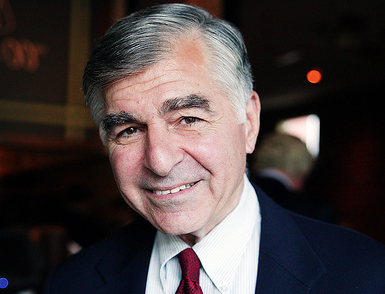
Governor Michael Dukakis
Founder; Chairman of The Board of Directors and Board of Thinkers, The Boston Global Forum. Democratic Party Nominee for President of the United States, 1988. Distinguished Professor J.D., Harvard University
Michael Stanley Dukakis was born in Brookline, Massachusetts to Greek immigrant parents. He attended Swarthmore College and Harvard Law School and served in the United States Army from 1955-1957, sixteen months of which was with the support group to the U.S. delegation to the Military Armistice Commission in Korea.
He served eight years as a member of the Massachusetts legislature and was elected governor of Massachusetts three times. He was the Democratic nominee for the presidency in 1988. Since 1991 he has been a distinguished professor of political science at Northeastern University in Boston, and since 1996 visiting professor of public policy during the winter quarter at UCLA in Los Angeles. He is chairman of Boston Global Forum. He is married to the former Kitty Dickson. They have three children—John, Andrea and Kara—and eight grandchildren.
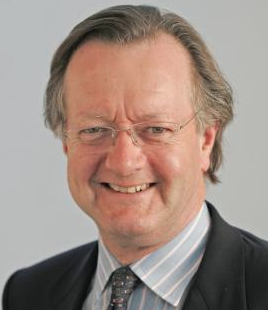
Professor John A. Quelch
Co-Founder, and Member of Board of Directors, Board of Thinkers , Boston Global Forum.
John A. Quelch is the Charles Edward Wilson Professor of Business Administration at Harvard Business School. He holds a joint appointment at Harvard School of Public Health as Professor in Health Policy and Management. He is also a fellow of the Harvard China Fund, a Member of the Harvard China Advisory Board and Associate in Research at the Fairbank Center for Chinese Studies. Between 2011 and 2013, Professor Quelch was Dean, Vice President and Distinguished Professor of International Management at CEIBS, China’s leading business school. Between 2001 and 2011, he was the Lincoln Filene Professor of Business Administration and Senior Associate Dean at Harvard Business School. He served as Dean of London Business School from 1998 to 2001. Prior to 1998, he was the Sebastian S. Kresge Professor of Marketing and Co-Chair of the Marketing Unit at Harvard Business School. Professor Quelch is known for his teaching materials and innovations in pedagogy. Over the past twenty-five years, his case studies have sold over 4 million copies, third highest in HBS history. In 1995, he developed the first HBS interactive CD-ROM exercise (on Intel’s advertising budgeting process). In 1999, he developed and presented a series of twelve one hour programs on Marketing Management for the Public Broadcasting System. Professor Quelch’s research focus is on global marketing and branding in emerging as well as developed markets. His current research projects address (a) understanding the contributions of marketing to the functioning of democracies and (b) formalizing appropriate marketing and customer metrics for periodic review by boards of directors. Professor Quelch is the author, co-author or editor of twenty-five books, including All Business Is Local (2011), Greater Good: How Good Marketing Makes for Better Democracy (2008), Business Solutions for the Global Poor: Creating Social and Economic Value (2007), The New Global Brands (2006), Global Marketing Management (5th edition, 2006), The Global Market (2005), Cases in Advertising and Promotion Management (4th Edition, 1996) and The Marketing Challenge of Europe 1992 (2nd edition, 1991). He has published eighteen articles on marketing strategy issues in the Harvard Business Review, most recently “How To Market In A Downturn” (April 2009), and many more in other leading management journals such as McKinsey Quarterly and Sloan Management Review. Professor Quelch has served as an independent director of twelve publicly listed companies in the USA and UK. He is currently a non-executive director of WPP and Alere. He served pro bono for eight years as Chairman of the Port Authority of Massachusetts. He is the Honorary Consul General of Morocco in New England and served previously as Chairman of the British-American Business Council of New England. Professor Quelch has been a consultant, seminar leader and speaker for firms, industry associations and government agencies in more than fifty countries. He is a member of the Trilateral Commission and the Council On Foreign Relations. He received the CBE for services to British business in 2011 and holds an honorary doctorate from Vietnam National University. Professor Quelch was born in London, England, was educated at Exeter College, Oxford University (BA and MA), the Wharton School of the University of Pennsylvania (MBA), the Harvard School of Public Health (MS) and Harvard Business School (DBA). In addition to the UK and USA, he has lived in Australia and Canada.
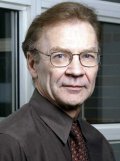
Professor Thomas E. Patterson
Thomas E. Patterson is Bradlee Professor of Government and the Press of Harvard Kennedy School and a co-founding member of BGF’s Board of Directors. His book, The Vanishing Voter, looks at the causes and consequences of electoral participation. His earlier book on the media’s political role, Out of Order, received the American Political Science Association’s Graber Award as the best book of the decade in political communication. His first book, The Unseeing Eye, was named by the American Association for Public Opinion Research as one of the 50 most influential books on public opinion in the past half century. He also is author of Mass Media Election and two general American government texts: The American Democracy and We the People. His articles have appeared in Political Communication, Journal of Communication, and other academic journals, as well as in the popular press. His research has been funded by the Ford, Markle, Smith-Richardson, Pew, Knight, Carnegie, and National Science foundation. Patterson received his PhD from the University of Minnesota in 1971.
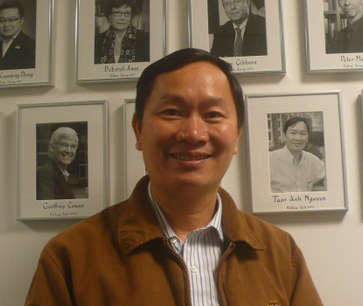
Mr. Nguyen Anh Tuan
Co-Founder and Editor-in-Chief of The Boston Global Forum.
Nguyen Anh Tuan was the Founder and Chairman of the VietNamNet Media Group and the Founder and Editor-in-Chief of VietNamNet Online Newspaper. Tuan was also the Founder and CEO of the VASC Software and Media Company and VietNet, the first Internet service provider in Vietnam. In 1996, Tuan was named as one of the Top Ten Outstanding Young Talents of Vietnam by the Prime Minister. Under Tuan’s leadership, VietNamNet raised significant political topics for reform in Vietnam. He pioneered an interactive live format called the “VietNamNet Online Roundtable” that enabled readers to participate in interviews of leading political, social and cultural figures. In 2009, Tuan conceived a global initiative called the “World Compassion and Reconciliation Day” on September 9th of each year. In 2007, as the Shorenstein Center’s Fellow, Tuan researched key trends in the development of electronic media in Vietnam. In 2011, Tuan was a part of the Pacific Leadership Fellows Program at the School of International Relations and Pacific Studies at the University of California in San Diego. That year, he was also a speaker at the prestigious annual Club de Madrid Conference on the subject of Democracy and Digital Technology. Since February 2011, Tuan has been an Associate of the Shorenstein Center on the Press, Politics and Public Policy, John F. Kennedy School of Government, Harvard University. In April 2012, he founded the Tran Nhan Tong Academy . In December 2012, Tuan co-founded the Boston Global Forum with the Honorable Michael Dukakis who was Massachusetts Governor and U.S. Presidential Nominee, and currently serving as the Boston Global Forum’s Chief Executive Board and Editor-in-Chief . Also in 2012, together with Ambassador Swanee Hunt, Tuan established the Charles Ansbacher Music Club to bring classical music to people who live in remote and distant locations. Tuan has been a member of Harvard Business School Global Advisory Board since 2008. He also serves on the Board of Trustees of the Free for All Concert Fund in Boston.

Prime Minister Kevin Rudd
Former Australian Prime Minister Kevin Rudd is a senior fellow at Harvard Kennedy School’s Belfer Center for Science and International Affairs. His fellowship began in February 2014. At the Belfer Center, Rudd will lead a major research effort on possibilities and impacts of a new strategic relationship between China and the United States. Mr. Rudd served as Australia’s 26th Prime Minister from 2007 to 2010, then as Foreign Minister from 2010 to 2012, before returning to the Prime Ministership in 2013. As Prime Minister, Mr. Rudd led Australia’s response during the Global Financial Crisis. Australia’s fiscal response to the crisis was reviewed by the IMF as the most effective stimulus strategy of all member states. Australia was the only major advanced economy not to go into recession. Mr. Rudd is also internationally recognized as one of the founders of the G20 which drove the global response to the crisis, and which in 2009 helped prevent the crisis from spiraling into a second global depression. As Prime Minister and Foreign Minister, Mr. Rudd was active in global and regional foreign policy leadership. He was a driving force in expanding the East Asia Summit to include both the US and Russia in 2010. He also initiated the concept of transforming the EAS into a wider Asia Pacific Community to help manage deep-routed tensions in Asia by building over time the institutions and culture of common security in Asia. On climate change, Mr. Rudd ratified the Kyoto Protocol in 2007 and legislated in 2008 for a 20% mandatory renewable energy target for Australia. Mr. Rudd launched Australia’s challenge in the International Court of Justice with the object of stopping Japanese whaling in the Southern Ocean. Mr Rudd drove Australia’s successful bid for its current non-permanent seat on the United Nation’s Security Council and the near doubling of Australia’s foreign aid budget. Domestically, Mr. Rudd delivered Australia’s first national apology to indigenous Australians as his first act as Prime Minister. His government introduced Australia’s first ever nation-wide school curriculum. He legislated for the biggest school modernization program in Australian history with the construction of new state-of-the art libraries, classrooms and multi-purpose facilities for every Australian primary school. To overcome the digital divide, he provided lap top computers for every year 9-12 secondary school student. On health, Mr. Rudd in 2010 negotiated with the Australian states a National Heath and Hospitals Reform Agreement, the biggest reform and investment in the health system in 30 years. In defiance of Big Tobacco, his government introduced the world’s first plain-packaging regime for all tobacco products. To improve the rate of organ and tissue donation, he established Australia’s first National Organ and Tissue Transplant Authority. In 2010, his government introduced Australia’s first ever paid parental leave scheme. He also established Australia’s first ever dedicated Australian Children’s Network. Mr. Rudd remains engaged in a range of international challenges including global economic management, the rise of China, climate change and sustainable development. He is on the International Advisory Panel of Chatham House. He is a proficient speaker of Mandarin Chinese, a Visiting Professor at Tsinghua University and funded the establishment of the Australian Centre on China in the World at the Australian National University. He was a co-author of the recent report of the UN Secretary General’s High Level Panel on Global Sustainability – “Resilient People, Resilient Planet” and chairs the World Economic Forum’s Global Agenda Council on Fragile States. He also remains actively engaged in indigenous reconciliation.

President Vaira Vike-Freiberga
Vaira Vike-Freiberga was the sixth President of Latvia and the first female President of Latvia. She was elected President of Latvia in 1999 and re-lected in 2003. In December 2013, she was elected as the President of the World Leadership Alliance – Club de Madrid. President Vike-Freiberga is also a member of BGF’s Board of Thinkers. Dr. Vaira Vike-Freiberga is a professor and interdisciplinary scholar having published eleven books and numerous articles, essays and book chapters in addition to her extensive speaking engagements. As President of the Republic of Latvia 1999-2007, she has been instrumental in achieving membership in the European Union and NATO for her country. She is active in international politics, was named Special Envoy to the Secretary General on United Nations reform and was official candidate for UN Secretary General in 2006. She remains active in the international arena and continues to speak up in defense of liberty, equality and social justice, and for the need of Europe to acknowledge the whole of its history. In December 2007 she was named vice-chair of the Reflection group on the long term future of the European Union (2007-2010). Chair of the high-level group on Freedom and Pluralism of the Media in European Union, established by the vice-president of the European Commission (2011-2012). She is also known for her work in psycholinguistics, semiotics and analysis of the oral literature of her native country. Vaira Vike earned a B.A (1958) and an M.A (1960) in Psychology at the University of Toronto; and a Ph.D (1965) in experimental psychology at McGill University in Montreal, Canada. She speaks Latvian, English, French, German and Spanish and understands Italian and Portuguese
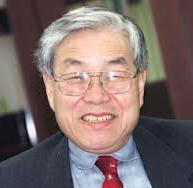
Professor Koichi Hamada
Koichi Hamada is Tuntex Professor of Economics at Yale University, where he specializes in the Japanese economy and international economics, and Professor Emeritus at the University of Tokyo, where he taught before coming to Yale in 1986. Professor Hamada has an L.L.B. (he passed Japan’s national Bar Examination in 1957), and an M.A. in Economics from the University of Tokyo as well as an M.A. and Ph. D. in Economics from Yale University. His work on policy coordination, one of which first applied game theory to international finance, was published as The Political Economy of International Monetary Interdependence (MIT Press, 1985), and some of his economic articles are collected in Strategic Approaches to the International Economy: Selected Essays of Koichi Hamada (Edward & Elgar, 1996). He is a fellow of the Econometric Society and served as its council member from 1980 to 1985. Hamada was the President of the Japanese Association of Economics and Econometrics (now the Japan Economic Association) from 1994 to 1995 and was the founding President of the Japan Law and Economics Association in 2003 (now its honorary fellow). He was awarded the imperial decoration, the Order of the Sacred Treasure, Gold and Silver Star, which is given to those who have accumulated distinguished achievements for Japan, 2006.
In Japan, he participated in many policy committees at the Ministry of Finance, MITI, the Economic Planning Agency and other ministries. Hamada also serves as one of the associate editors for many journals including Econometrica, Journal of International Economics, Journal of Economic Theory, Journal of Public Economics, Journal of Development Economics and Journal of the Japanese and International Economies. Hamada’s game-theoretic study of international monetary relations is regarded as one of the first studies that drew attention to the strategic aspects of macroeconomic policy in interdependent nations. He was one among the few who applied the methodology of “Law and Economics” to Japan’s legal system in the 1970s. His current research topics include: international capital movements, regional integration, political economy of international monetary reform, economics and politics of Japan’s last decade, a comparison of economic functions of the Japanese and the U.S. legal systems. In 1997, Professor Hamada served as a member of the external evaluation team of the Enhanced Structural Adjustment Facility (ESAF) Program of the International Monetary Fund by request of its Board of Directors. He was a member of the Consulting Group that advised Mike Moore, Director General of the World Trade Organization (WTO), on the future perspectives for the world trade system, and he was until recently a member of the Consulting Group that advises Supachai Panitchpakdi, Director General of the WTO. From January 2001 to July 2002, Professor Hamada was on leave from Yale University to serve as the first President of the Economic and Social Research Institute (ESRI, keizai Shakai sogo kenkyujocho), Cabinet Office of the Japanese Government. The ESRI engages in policy-oriented research and compiling the GDP statistics. Hamada was in a position to advise the Council on Economic and Fiscal Policy (CEFP KeizaiZaisei Shimonkaigi), a body created to promote the administrative reform (Kozo Kaikaku) chaired by the Prime Minister. Koichi Hamada was a recipient of a Fulbright Scholarship, the Ford Dissertation Fellowship and the Center for Institutional Reform and the Informal Sector (IRIS) Fellowship. He was a recipient of Nikkei Tosho Bunka Prize (1967) for “Economic Growth and Capital Movements,” the Ekonomisuto prize (1980) for “Banking Behavior and Monetary Policy.” He was also awarded the Otto Eckstein Prize (1988) by the Eastern Economic Association for “The Impact of the General Theory in Japan,” recognized as the best article in the Eastern Economic Review for the year. 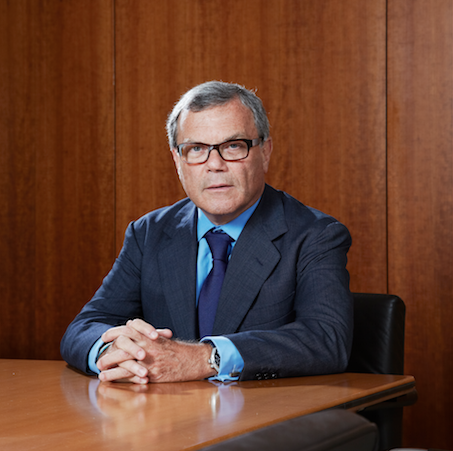
Sir Martin Sorrell, Chief Executive, WPP
Sir Martin Sorrell founded WPP, the world’s leading advertising and marketing services group in 1985 and has been chief executive throughout. WPP companies, which include some of the most eminent agencies in the business, provide clients with advertising, media investment management, data investment management, public relations and public affairs, branding and identity, healthcare communications, direct, digital, promotion and relationship marketing and specialist communications services. Collectively, WPP employs nearly 175,000 people (including associates) in over 3,000 offices in 110 countries. The Group’s worldwide companies include JWT, Ogilvy & Mather Advertising, Y&R, Grey, Mindshare, MEC, MediaCom, Kantar (including Millward Brown and TNS), Wunderman, Burson-Marsteller, Hill+Knowlton Strategies, Landor, Brand Union, Fitch, The Partners, AKQA and WPP Digital. Clients include 351 of the Fortune Global 500, all 30 of the Dow Jones 30, 69 of the NASDAQ 100 and 31 of the Fortune e-50. In 2013, WPP had revenues of $17.3 billion and billings of $72.3 billion. Sir Martin actively supports the advancement of international business schools – advising Harvard, IESE, the Indian School of Business and the China Europe International Business School. He has been publicly recognised with a number of awards including the Harvard Business School Alumni Achievement Award. He received a knighthood in January 2000. Sir Martin contributes to many important organizations and charities. Sir Martin is a non-executive director of Alpha Topco, the Formula 1 company and Alcoa. He is on the Executive Committee of the World Economic Forum International Business Council and a member of the Business Council in the US. He is a Trustee of the British Museum, a member of the corporate Advisory Group of the Tate Gallery, and on the International Advisory Board of The Russian Museum in St. Petersburg. In 2010 he was appointed to the Board of Directors of the Bloomberg Family Foundation. In 2011 he was appointed a member of the Advisory Board of Stanhope Capital. He is vice-chairman of IBLAC. He is Chairman of IBAC London, IBAC Rome and IBAC Jerusalem. 
Sir David Warren
Sir David Warren served as British Ambassador to Japan from 2008 to 2012. Following language training in Japanese, he was first appointed to Japan in the late 1970s. His career since then has included a term as Assistant Head of the Far East Department at the FCO and five years in Tokyo as Commercial Counsellor, 1993-1998. He has also served as Head of the FCO’s China Hong Kong Department and Director of UK Trade and Investment. He was Director of Human Resources at FCO before going to Tokyo as Ambassador and formally takes up his new role as chairman of the Japan Society on 1 January 2013. 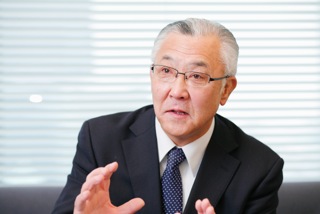
Professor Kosaku Dairokuno
Currently Dean of the School of Political Science and Economics. After he earned his BA at the School of Law, Meiji University, he has shifted his focus of study from law to political science. He earned his MA in Comparative Politics at the Graduate School of Political Science and Economics at Meiji University. And, immediately after he completed all the necessary course work for Ph,D, he was given a position of lecturer at the School of Political Science and Economics. He has been with the same school ever since. In the meantime, he was a visiting scholar and professor at various institutions such as Asian Pacific Studies Institute of Duke University, the Department of Politics of Northeastern University, the National School of Public Administration of Laos, and the National University of Laos. Currently he has been studying the relationships between “political corruption” and the structure of government.
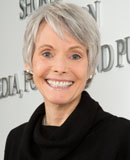
Jill Dougherty
Jill Dougherty worked for CNN from 1983 until December 2013, most recently as foreign affairs correspondent based in Washington, D.C. She also served as White House correspondent, Moscow bureau chief, U.S. affairs editor for CNN International, managing editor for CNN International Asia Pacific and Midwest correspondent based in Chicago. Prior to CNN, Dougherty was correspondent for WMAQ-TV in Chicago and has done freelance assignments for NPR andTime magazine. She began her career as a broadcaster and writer for Voice of America, USSR division. While at the Shorenstein Center, she will be writing a paper on the relationship between the Russian government and the media.
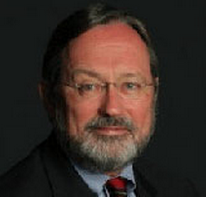
U.S. Ambassador, ret. J.D. Bindenagel
J.D. Bindenagel, Vice President for Community, Government, and International Affairs, is responsible for deepening connections between DePaul’s Chicago and overseas campuses and communities. These local, global and government relationships support DePaul’s mission to prepare students, not only to better understand, but also to influence and shape the world in which they live. A former ambassador and 28-year veteran of the U.S. diplomatic corps, Bindenagel brings extensive experience in governmental and international affairs to his new post. Prior to joining DePaul, he was vice president for program at the Chicago Council on Foreign Relations. President Bill Clinton appointed him in 1999 as U.S. ambassador and special envoy for Holocaust issues. As ambassador, he provided policy, diplomatic and negotiating advice to the Secretary of State on World War II-era forced labor, insurance, art, property restitution, and Holocaust education and remembrance. He played an instrumental role in the negotiations that led to agreements in 2001 securing $6 billion in payments from Germany, Austria and France for Holocaust and other Nazi victims. A U.S. Army veteran, he served the State Department in Washington, D.C., and Germany in various capacities from 1975 to 2003. He was director for Central European Affairs in the Bureau of European and Canadian Affairs at the State Department from 1992 to 1994 and U.S. charge d’affaires and deputy chief of mission in Bonn, Germany, from 1994 to 1997. He was U.S. deputy chief of mission at the American Embassy in Berlin, East Germany, at the time of the fall of the Berlin Wall in 1989 and helped negotiate the reunification of Germany. Other Foreign Service assignments included head of the embassy political affairs unit in Bonn in the mid-1980s, when he helped pave the way for the deployment of U.S. Pershing missiles on German soil. Bindenagel was special U.S. negotiator for “Conflict Diamonds,” leading a U.S. government interagency group to create a certification process to prevent proceeds from sales of illicit rough “conflict” diamonds from financing insurrections against legitimate governments in Africa. He also was an American Political Science Association fellow with Congressman Lee H. Hamilton (1987-1988) and was director, Business-Government Programs for Rockwell International (1991-1992). Bindenagel received the State Department’s Distinguished Service Award in 2001, the Commander’s Cross of the Federal Order of Merit from the President of Germany in 2001, and the Presidential Meritorious Service Award from President George W. Bush in 2002. He holds a bachelor’s degree in political science and a master’s degree in public administration from the University of Illinois at Urbana-Champaign.

Andrew Cainey
As a Senior Fellow of the Fung Global Institute, Andrew Cainey conducts research that explores how the financial sector can support the needs of Asia’s real economy, the new business models that Asian financial institutions will need to prosper, and the implications for an Asian financial architecture and regulatory framework. In his twenty-five years of management consulting experience in Asia and Europe, Andrew’s primary focus has been strategy development, organization design and capability-building in the financial sector, where he has worked with numerous leading Asian and global banks, securities firms, insurers, asset managers, sovereign wealth funds and regulators. Most recently, he was Managing Partner of Booz & Company’s Greater China business. He is also a non-executive director of Lumen Capital Investors, a Singapore-based wealth management company. Andrew moved to Asia in 1997, living first in Seoul then Singapore, Beijing, Shanghai and now, again, in Seoul. He is the author of China’s Finance Sector: New Opportunities (published in Chinese: 中国金融业的新未来), and co-author of Soft Power: The Next Challenge for Chinese Companies (Harvard Business Review China: 软实力:中国企业的下一个硬仗). He has also made multiple contributions to Caijing, the independent Beijing-based business magazine, on China’s financial sector development. He previously led the Asian financial services practice of the Boston Consulting Group and has also served as a policy advisor on public sector reform to the British Conservative Party. Andrew holds a First Class BA and MA (Hons) in Economics from the University of Cambridge and an MBA with Distinction from the Harvard Business School where he was a Kennedy Scholar. He has a good command of Mandarin Chinese and speaks several European languages.
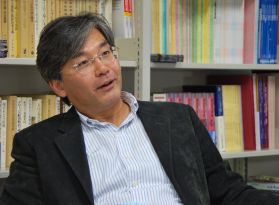
Professor Shigeto Sonoda
Prof. Shigeto Sonoda is a professor of sociology and Asian studies at the University of Tokyo. After his 19 years’ service for private universities, Prof. Sonoda went back to his alma mater in 2009 when he was appointed as professor both at the Interfaculty Initiative for Information Stuides and Institute for Advanced Studies on Asia (former Institute of Oriental Culture) . Prof. Sonoda has taken initiatives in conducting researches including AsiaBarometer 2003-2008, Asia Student Survey 2008, Tianjin Annual Survey 1997-2011. His special interest is in social stratification and globalization of cultures in Asia, and localization process of Japanese company in Asian countries. His latest publications include: Risk in East Asia, Keiso-shobo (editor, 2013, in Japanese), Sino-Japan Relations, 1972-2012 III. Society and Culture , University of Tokyo Press (editor, 2012, in Japanese), China Issues: How Experts See the Future of China, University of Tokyo Press (co-editor, 2012, in Japanese), Emerging Middle Classes in East Asia, Keisho-shobo (editor, 2012, in Japanese), Can Education Solve Social Inequality?, Iwanami Shoten Publishers (with Atsuko Shimbo, 2010, in Japanese), Social Inequality in Contemporary China, Chuo Koron (2008, in Japanese, awarded Special Prize of 20th Asia-Pacific Award), Where Chinese Society is Heading for?: Dialogue with Chinese Sociologists, Iwanami Shoten Publishers (editor, 2008, in Japanese). Prof. Sonoda has worked with a lot of prominent Asian sociologists including Profs. Han Joon (Yonsei), Yoon In-jin (Korea), Park Joon-shik (Hallym), Kang Myung-ku (SNU) in Korea, Profs. Michael Hsiao H.H. (Academia Sinica), Su Kuo-hsien (NTU), Wang Jenn-hwan (National Chengchi), Chang Chia-ming (Soochow) in Taiwan, Profs. Li Chunling (CASS), Li Lulu (Renmin University of China), Pan Yunkang (TASS), Liu Xin (Fudan), Zhou Xiaohong (Nanjing), Lui Tai-lok (HKU) in China, and so on. Prof. Sonoda initiated a lot of research/academic activities, and the most recent ones are “Frontier of Comparative Studies of Asian Studies” (2010-12 FY) “Educational Program for Young Scholars on ‘Asia Globalization Studies’” (2009-2012 FY), both of which were financially supported by Japan Society for Promotion of Science. 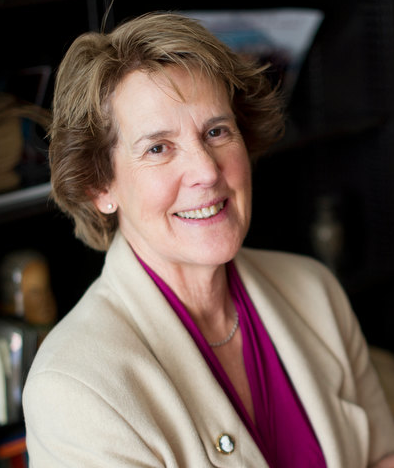
Professor Suzanne P. Ogden
Professor Suzanne P. Ogden is a Professor and Interim Chair of Northeastern University’s Department of Political Science. Professor Ogden’s areas of study include comparative politics, Chinese politics, democratization and development in China, international relations, US-China relations, and US policy towards Asia.
During her career, Professor Ogden has written and edited numerous publications, which include Inklings of Democracy in China and China’s Unresolved Issues: Politics, Development and Culture. Professor Ogden has also held positions as: Research Associate at Harvard University’s Fairbank Center for East Asian Research; as a Visiting Fellow at Cambridge University’s Wolfson College; Visiting Scholar at National University of Singapore’s East Asian Research Institute; Visiting Scholar at Cambridge University’s Faculty of Oriental Studies; Fulbright Lecturer at the Foreign Affairs College of the Chinese Foreign Ministry; as a member of the Editorial Board for the Journal of Contemporary China; and, as a member of the National Committee on U.S.-China Relations.
Currently Professor Ogden teaches both graduate and undergraduate level courses on international relations, urban planning in China, Chinese politics, and Chinese foreign policy. Professor Ogden holds a PhD from Brown University.
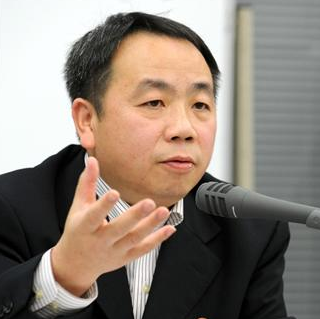
Dr. Hei Seki
Mr. Hei Seki was born in 1962 in Sichuan Province, the People’s Republic of China. Seki graduated from the Department of Philosophy, Peking University. In 1988, Seki moved to Japan. After acquiring his doctoral degree from Graduate School of Cultural Studies, Kobe University, he started working for a private research institute. After publishing his bookNaze Chugokujin wa Nihonjin wo Nikumunoka (Why Chinese Hate Japanese: PHP Institute), which warned about the rise of anti-Japanese emotion in China, Seki started his critic activities. Seki’s works include Rongo Dojo (Lecture of the Analects of Confucius: Chichi Publishing Co., Ltd), Boryakuka tachi no Chugoku (Conspirators’ China: PHP Institute), Chugokujin no Shoutai (The Real Face of China: TAKARAJIMASHA,Inc.), Chugokuban Sabupuraimu ro-n no kyoufu (The Fear of Chinese Subprime Loan: GENTOSHA INC.) and Naze Nihon wa Chugoku kara hanareruto umaku ikunoka (Why it would work out better for Japan if it parts away from China: PHP Institute). Currently Hei is a visiting professor at Takushoku University. Hei also contributes to the bi-weekly opinion column “Hei Seki’s China Watch” for the Sankei Shimbun Newspaper.
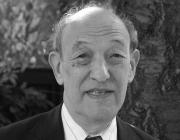
Professor Ezra Vogel
Ezra F. Vogel is the Henry Ford II Professor of the Social Sciences Emeritus at Harvard. After graduating from Ohio Wesleyan in 1950 and serving two years in the U.S. Army, he studied sociology in the Department of Social Relations at Harvard, receiving his Ph.D. in 1958. He then went to Japan for two years to study the Japanese language and conduct research interviews with middle-class families. In 1960-1961 he was assistant professor at Yale University and from 1961-1964 a post-doctoral fellow at Harvard, studying Chinese language and history. He remained at Harvard, becoming lecturer in 1964 and, in 1967, professor. He retired from teaching on June 30, 2000. Vogel succeeded John Fairbank to become the second Director (1972-1977) of Harvard’s East Asian Research Center and Chairman of the Council for East Asian Studies (1977-1980). He was Director of the Program on U.S.-Japan Relations at the Center for International Affairs (1980-1987) and, since 1987, Honorary Director. He was Chairman of the undergraduate concentration in East Asian Studies from its inception in 1972 until 1991. He was Director of the Fairbank Center (1995-1999) and the first Director of the Asia Center (1997-1999). Vogel was Chairman of the Harvard Committee to Welcome President Jiang Zemin (1998). He has also served as Co-director of the Asia Foundation Task Force on East Asian Policy Recommendations for the New Administration (2001). Drawing on his original field work in Japan, he wrote Japan’s New Middle Class (1963). A book based on several years of interviewing and reading materials from China, Canton Under Communism (1969), won the Harvard University Press faculty book of the year award. The Japanese edition of his book Japan as Number One: Lessons for America (1979) is the all-time best-seller in Japan of non-fiction by a Western author. In Comeback (1988), he suggested things America might do to respond to the Japanese challenge. He spent eight months in 1987, at the invitation of the Guangdong Provincial Government, studying the economic and social progress of the province since it took the lead in pioneering economic reform in 1978. The results are reported in One Step Ahead in China: Guangdong Under Reform (1989). His Reischauer Lectures were published in The Four Little Dragons: The Spread of Industrialization in East Asia (1991). His most recent publication is Is Japan Still Number One? (2000). He has visited East Asia every summer since 1958 and has spent a total of over six years in Asia. Vogel has received honorary degrees from Kwansei Gakuin (Japan), the Monterrey Institute, the Universities of Maryland, Massachusetts (Lowell), Wittenberg, Bowling Green, Albion, Ohio Wesleyan, Chinese University (Hong Kong) and Yamaguchi University (Japan). He received The Japan Foundation Prize in 1996 and the Japan Society Prize in 1998. He has lectured frequently in Asia, in both Chinese and Japanese. From fall 1993 to fall 1995, Vogel took a two-year leave of absence from Harvard to serve as the National Intelligence Officer for East Asia at the National Intelligence Council in Washington. He directed the American Assembly on China in November 1996 and the Joint Chinese-American Assembly between China and the United States in 1998. He is married to Charlotte Ikels, professor of anthropology at Case Western University and has three children – David, Steven, and Eve.

Professor Richard N. Rosecrance
Richard Rosecrance is an Adjunct Professor at Harvard’s John F. Kennedy School of Government, a Research Professor of Political Science at the University of California, Los Angeles. He was formerly a Professor at the University of California, Berkeley, and the Walter S. Carpenter, Jr., Professor of International and Comparative Politics at Cornell University. He served in the Policy Planning Council of the Department of State. He has written or edited more than a dozen books and many scholarly articles. The singly authored works include Action and Reaction in World Politics (1963); Defense of the Realm: British Strategy in the Nuclear Epoch (1968); International Relations: Peace or War? (1973); The Rise of the Trading State: Commerce and Conquest in the Modern World (1986); America’s Economic Resurgence (1990); and The Rise of the Virtual State: Wealth and Power in the Coming Center (1999). The edited volumes include The Dispersion of Nuclear Weapons: Strategy and Politics (1964); The Future of the International Strategic System (1972);America as an Ordinary Country (1976); The Domestic Bases of Grand Strategy(1993); The Costs of Conflict (1999); and The New Coalition of Great Powers(2001). He is the principal investigator of UCLA’s Carnegie Project on “Globalization and Self Determination”. He has received Guggenheim, Rockefeller, Ford, Fulbright, NATO, and many other fellowships. He was President of the International Studies Association and served as Director of UCLA’s Center for International Relations from 1992 to 2000. He has held research and teaching appointments in Florence (the European University Institute); Paris (the Institut de Sciences Politiques), London (Kings College London, the London School of Economics, and the International Institute for Strategic Studies), and Canberra (The Australian National University). He has lectured widely in East Asia and Europe. His recent book on the “virtual state” has been translated into Japanese, Chinese (Taiwan), German and will shortly appear in Arabic and Mandarin and in a French volume of colloquy and comments of French scholars entitled “Débat sur L’État Virtuel“. Professor Rosecrance is now at work on a book on international mergers which compares U.S. with European political and economic strategies.

H.D.S. Greenway
H.D.S. Greenway has been a journalist for 50 years and recently retired from the Boston Globe after a distinguished career, most recently as its editorial page editor. He continues to write a column that appears regularly in the Boston Globe and the International Herald Tribune. He joined the Boston Globe to become foreign and national editor, in charge of the Globe’s Washington bureau and tasked with building a foreign news service. He created bureaus in London,Tokyo, Canada, Moscow, Latin America and Jerusalem. During his long career, Greenway has covered conflicts in Indochina, Lebanon, Iraq, Pakistan, Burma, Central America, Bosnia and Croatia. After service in the U.S. Navy, Greenway worked for the Time-Life News Service in Oxford, London, Washington, Boston, Saigon,Bangkok, the United Nations and Hong Kong. He joined the Washington Post and returned to Hong Kong, reporting from Saigon, Phnom Penh, and Laos until the final evacuation of Americans. He then covered theMiddle East and Iran, based in Jerusalem. Greenway was wounded in Vietnam and awarded a Bronze Star with Valor by the U.S. Marine Corps. He was educated at Yale and Oxford, and was a Nieman Fellow at Harvard.
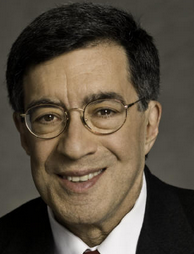
David A. Andelman
David A. Andelman is the Editor of World Policy Journal. Previously he served as Executive Editor of Forbes.com. Earlier, he was a domestic and foreign correspondent for The New York Times in various posts in New York and Washington, as Southeast Asia bureau chief, based in Bangkok, then East European bureau chief, based in Belgrade. He then moved to CBS News where he served for seven years as Paris correspondent, traveling through and reporting from nearly 60 countries. There followed service as a Washington correspondent for CNBC, news editor of Bloomberg News and Business Editor of the New York Daily News. He also served as senior vice president of Burson-Marsteller in New York and Washington. He is the author of three books, The Peacemakers, published by Harper & Row, and The Fourth World War, published by William Morrow, which he co-authored with the Count de Marenches, long-time head of French intelligence. His third book, A Shattered Peace: Versailles 1919 and the Price We Pay Todaywas published by John Wiley & Sons. Andelman has written for such publications as Harpers, The Atlantic, The New Republic, The New York Times Magazine, Foreign Policy and Foreign Affairs. He is a graduate of Harvard University and the Columbia University Graduate School of Journalism, and is a member of the Century Association, the Council on Foreign Relations, the Harvard Club of New York, the National Press Club and the Grolier Club. In August 2010, he was elected President of the Overseas Press Club.
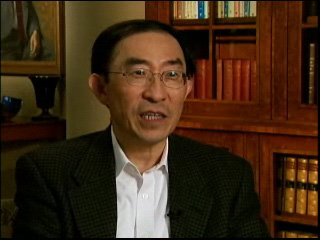
Ken Hakuta
Ken Paik Hakuta, known as “Dr. Fad” since 1983, is an American inventor and television personality. Hakuta, as Dr. Fad, was the host of the popular kids invention TV show, The Dr. Fad Show, which ran from 1988 to 1994. The show featured kids’ inventions, and promoted creativity and inventiveness in children. Hakuta was the organizer of four Fad Fairs, conventions of inventors with fun, wacky ideas, in Detroit, New York, and Philadelphia. He received the Inventor of the Year Award from the Franklin Institute in Philadelphia. Hakuta is the popularizer of the Wacky Wall Walker , one of the best selling toys of the 1980s. The Wacky Wall Walker became a fad hit in 1983, and over 240 million units have sold. Their popularity peaked after the Kellogg Company inserted them as free prizes in cereal boxes. The VH1 program “I Love the 80’s: 1983” features Dr. Fad and the Wall Walkers. In 1991, Hakuta purchased a large group of Shaker items – furniture and other pieces – that are now called the Mt. Lebanon Shaker collection. In 1998, Hakuta built on his long-standing interest in herbal medicine to found AllHerb.com, an eCommerce company offering herbal remedy products and information. AllHerb.com sought to differentiate itself from other competitors in the space by positioning itself as “the most authentic resource for herbal medicine available today”; for instance, one of its spokespeople was a shaman, tribal healer, and herbalist from the Peruvian rainforest. AllHerb.com ceased operations in February 2000, leaving the space to larger competitors such as MotherNature.com and Vitamins.com. Hakuta has been featured in numerous media such as: The Washington Post, The New York Times, The Los Angeles Times, The Detroit Free Press, USA Today, TIME, Newsweek, Forbes, Fortune, Inc, Entrepreneurship, Business Week, CBS Evening News, 60 Minutes, 48 Hours, Lifestyles of the Rich and Famous, Oprah, Geraldo, Today Show, The Tonight Show, Late Night with Conan O’Brien, The Don and Mike Show, Larry King, and numerous radio shows around the country. There are two Harvard Business School case studies on AllHerb.com: “Ken Hakuta: AllHerb.com” and “AllHerb.com: Evolution of an E-tailer.”
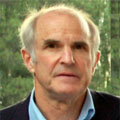
Professor Douglas Coulter
Douglas Coulter is currently a Visiting Professor at Guanghua School of Management at Peking University. His research interests include finance, accounting, and business strategy.
In the past, Professor Coulter has worked as a political consultant and campaign director on Democratic Presidential general election campaigns in Wisconsin and Indiana, as the Commissioner of the Copyright Royalty Tribunal in Washington,D.C., as a preceptor at Harvard University, as a Professor at the Business School of Moscow State University, and as a Professor in the International Business Department at Beijing Foreign Studies University.
Professor Douglas holds a B.A. in Economics from Harvard University, a MBA from INSEAD European Institute of Business Administration in Fontainebleau, France, and a MBA, Harvard University.
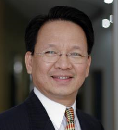
Kien Pham
Mr. Kien Pham is an American investor and philanthropist. He is the president of the Vietnam Foundation, a U.S. non-profit organization established to support educational improvement in Vietnam. Mr. Pham is also a senior advisor to TPG, a private equity firm with $56 billion in investment worldwide. In addition, he serves as Board member and strategic advisor to his portfolio of Vietnamese companies in media, mobile technology, education, real estate and foods.
Mr. Pham grew up in Saigon, Vietnam. In 1977, he escaped by boat and came to the U.S. as a refugee. He settled in Colorado and began a new life as a factory worker while learning English at night; and later, attended college on scholarship. Mr. Pham received a bachelor in Marketing and International Business from the University of Colorado at Boulder, and won a senior scholarship to study in England. His graduate degrees, earned concurrently at Stanford University, included an MBA in International and Organizational Management, an MA in International Economics and a special diploma in Public Policy Management. In 1990, Stanford University featured Mr. Pham among its “100 Most Outstanding Alumni” in the school’s 100 years history. Mr. Pham is a recipient of an honorary Doctorate of Law degree from Pfeiffer University.
Mr. Pham has broad experiences in the business, government and non-profit sectors. In business, he was an executive in Fortune 500 companies such as Procter & Gamble and Tenneco, as well as entrepreneur owner in technology and consulting firms. In government, he worked at the White House, the Pentagon, and the U.S. Senate. In 2003, Mr. Pham returned to the government as the founding executive director of the Vietnam Education Foundation, an independent federal agency that selected and sent hundreds of top Vietnamese scholars to leading graduate schools in the U.S. Similarly in the non-profit sector, Mr. Pham has established foundations to assist college students, orphans and the handicapped in Vietnam. Mr. Pham is publicly recognized and awarded for his leadership and management abilities. In 1985, President Reagan introduced him to the nation as a White House Fellow at the age of 27, among the youngest ever in the history of that prestigious leadership program.
Mr. Pham is active in international affairs. In 1986, he was chosen for the Young Leader program by the American Council on Germany, and in 1992 named a U.S.-Japan Leadership Fellow by the Japan Society.
In 1993, he was elected as a term-member of the Council on Foreign Relations and a participant in the American Assembly. In 1996, Mr. Pham was a recipient of the “Never Fear, Never Quit” award. In 2000, he received the “Legacy of Leadership” award from the White House Fellows program for excellence in public service. In 2005, the Vietnamese Government presented Mr. Pham with the “Glory of Vietnam” award to recognize his contribution to the welfare and future of the Vietnamese people. In 2007, Mr. Pham was named Pacific Leadership Fellow by the University of California in San Diego.
Mr. Pham is married with three young children. He maintains legal residency in California and splits lime between the U.S. and Vietnam.
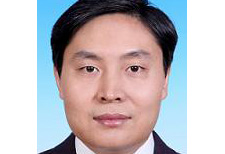
Zhang Youhai
Zhang Youhai is the Deputy Chief of the Comprehensive Division at the Beijing Municipal Commission of Commerce. Zhang received his B.A. from China Agricultural University and his M.A. from Peking University. When he is not working he engages in volunteer work and he has extensive volunteer work in the 2008 Beijing Olympic Games. As a Rajawali Fellow Zhang will conduct research on the construction of regional innovation systems focused on urban/city planning.
